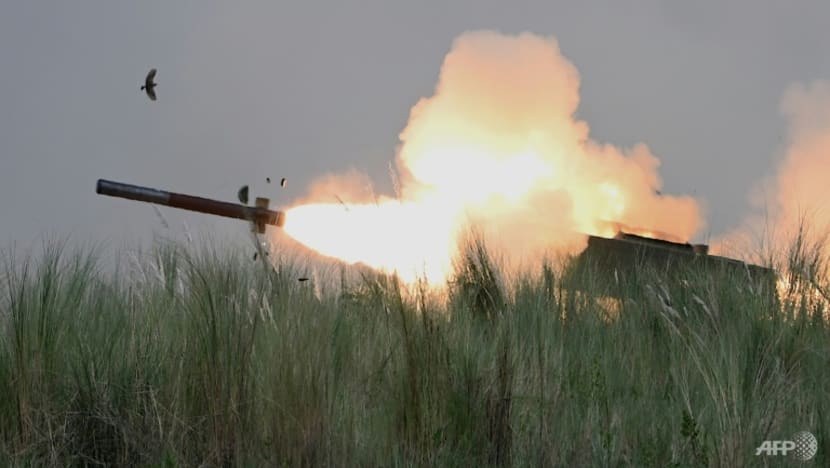Commentary: Claims that Poland missile strike will trigger World War III are irresponsible
The accidental missile strike in Poland set off commentary that the Ukraine conflict is spiralling into war between NATO and Russia. Such reasoning is not only inaccurate, but can be politically motivated, says Robert Kelly.

BUSAN: A persistent stream of commentary on the Ukraine war, since its start in February, claims that it might escalate into a major clash between North Atlantic Treaty Organization (NATO) countries and Russia. Even more frightening have been suggestions about World War III or even a nuclear exchange.
These scenarios are, thankfully, extremely unlikely. The conflict has in fact been characterised by the opposite – geographic containment within Ukraine and widespread concern by all parties, including Russia, to prevent it from widening to new parties or spiralling out of control.
This week’s accidental missile strike in Poland illustrates this caution. At first, it appeared to be a Russian-launched missile, and there was some irresponsible Twitter commentary about retaliating against Russia or invoking NATO collective security guarantees.
This was beaten back quickly on Western op-ed pages, and officials and leaders of NATO countries have been cautious in their statements. The aggrieved party – Poland – did not seek an Article 5 (of NATO Washington Treaty) invocation of collective security; instead, it sought the much more mild consultations of Article 4 of that treaty.
Further, it is highly unlikely that it was a Russian attack. Were Russia to attack NATO, it would launch a far bigger strike than one rocket against a Polish farm.
Increasingly, it appears that the missile was a Ukrainian air defence rocket which tragically crashed in Poland while attempting to shoot down incoming Russian air attacks.
Restraint was demonstrated all around in this incident. Russian President Vladimir Putin, for all his belligerence in Ukraine, did not take the massive risk of directly striking a NATO state. NATO did not overreact in response, despite some observers leaping to conclusions.
CAUTION ON ALL SIDES THROUGHOUT THE WAR
Ukraine’s mistake was an honest one. It is trying to defend its cities by shooting at incoming Russian missiles, and this mistake, common in warfare, only happened once. What seemed at the beginning of the week like a dangerously provocative moment will likely pass with no major change in the war.
This reflects the continuing inaccuracy of those who wish to end Western aid to Ukraine for fear it will lead to Russia-NATO escalation – or for pro-Russian political reasons.
We know now that US officials have been privately speaking to Russian officials since nearly the start of the war, particularly to discourage Russian nuclear weapons use. We also know, from China’s increasingly public statements, that Chinese President Xi Jinping opposes nuclear warfare in Ukraine.
Putin has threatened nuclear escalation since March but has not yet acted on it. He is almost certainly bluffing. Indeed, in a speech in September, he had to explicitly say he was not bluffing about nukes, because he has done so for months.
This month, he openly declared Russia would not use nuclear weapons, likely because of the pressure he was feeling from all sides not to take that escalatory step.
The West has been careful too. NATO rejected Ukraine’s request for a no-fly zone early in the war. This would have required NATO to shoot down Russian air assets over Ukraine, which the group deemed too risky.
The West has also been selective about the weapons systems donated to Ukraine. Throughout the war, Western leaders have expressed concern that top-tier systems with long-range strike capabilities, particularly aircraft and certain types of missiles, would be too risky to give to the Ukrainians, who might use them to strike inside Russia.
And Ukraine has broadly avoided striking Russia within its borders – even though the laws of war permit that – and it has not used donated weapons to do so.
FEAR OF ESCALATION IN A NUCLEARISED ENVIRONMENT
The reason for all this caution – despite a harsh war characterised by Russian brutality toward civilians – is the fear of escalation in a nuclearised environment. All players are aware that the Kremlin has nuclear weapons and would use them if Russia were invaded.
Ukraine and its NATO backers do not want to run that risk. Russia is similarly aware of NATO nuclear capabilities and have avoided ramping up the war with nuclear weapons or strikes on Ukraine’s supply pipelines inside NATO.
In short, the most obvious conclusion from the actual course of the war – despite routine bouts of alarmism – is that it is not escalating.
After nine months and major Russia defeats, the Ukraine war is not widening, unlike the case of World War I. A better description of it is a proxy war, where an outside party (NATO) is supporting a smaller power in a conflict against a great power – for example, in the Vietnam War or the Soviet war in Afghanistan in the 1980s.
Hence, the West need not have anxiety about helping Ukraine, within limits. Indeed, the World War III narrative is almost certainly motivated reasoning at this point. That is, the real purpose of invoking nukes and WWIII is to support a Russian victory, by suggesting that NATO abandon Ukraine because NATO assistance is escalatory.
There is little empirical evidence to support this argument. There is no need to facilitate Putin’s imperialism with lurid, exaggerated claims.
Robert Kelly (@Robert_E_Kelly) is a professor of international relations in the Department of Political Science at Pusan National University.


















